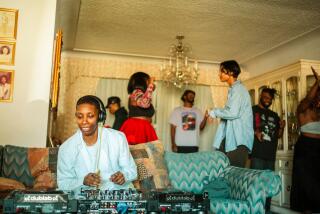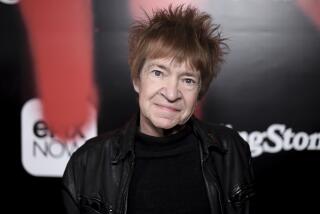He’s Living Proof That ‘No Color Lines’ Works
- Share via
Between 2 and 6 every weekday afternoon, female callers from teens to thirty-somethings overwhelm the request lines of radio station KKBT-FM (92.3)--popularly known as the Beat--all hoping for an encounter with Theo, the disc jockey with the most alluring bedroom voice on Los Angeles radio.
That voice has the kind comforting bass growl that soul men from Barry White to Isaac Hayes have used to entrance listeners for decades.
Given the voice and the station’s hip-hop/R&B; format, most listeners probably assume that he is African American.
Theo Mizuhara is, in fact, the son of second-generation Japanese American parents--and he’s such a hot figure in the hip-hop world that such hit rappers as Warren G and Tha Dogg Pound have had him as a guest on their albums. His was the voice on the radio throughout the film “Waiting to Exhale.”
“That’s the beautiful thing about music,” Theo, a somewhat shy man in his late 20s, says softly, with shadows hiding his face as he sits in a darkened office at the station’s headquarters in Hollywood.
“When we’re enjoying this good music, race isn’t important. If nothing else, we can use that as a catalyst, to get to know each other as people. That’s what ‘no color lines’ [the station’s slogan] is about.”
The San Mateo native grew up loving soul music, from the days he heard the Jackson 5 on the radio as a youngster until he started buying hip-hop records himself.
By the time he was in his late teens, he had made something of a name for himself in the Bay Area as a club deejay, where he used his turntable skills to blend hip-hop and dance singles in new and interesting ways.
He started his radio deejay career in the late ‘80s on San Francisco’s KMEL-FM, a sister station to the Beat. He switched to the Los Angeles outlet in 1993.
Though the music he plays on the air is largely picked by the station’s music director, Harold Austin, and his staff, most of the records mirror his own taste, which ranges from West Coast hip-hop to smooth R&B; oldies. In the car or at home, he’s as likely to be listening to Stevie Wonder, Al Green and Earth, Wind & Fire as Ice Cube or Dr. Dre.
“I love Dr. Dre’s production,” he says enthusiastically. “People just don’t appreciate the way he compresses a kick drum or adds reverb to a voice, or mixes a passage. He’s a revolutionary--a genius.”
Theo also applies the same “genius” moniker to the music of Babyface and D’Angelo, whose lush musical colors he finds breathtaking from a production standpoint. “You just have to love the fact that they’re alive and that God put them on the path of making music,” he says. “George Michael is like that, too. He has a certain kind of soul that can’t be denied.”
He’s also big on West Coast rap, from Ice Cube and Dre to DJ Quik and Snoop Doggy Dogg, citing a “rage that can’t be found in any other type of music.”
When asked about his growing popularity beyond the airwaves--record companies have hired him for production work and he has a recurring role on the “Dangerous Minds” TV series--Theo just laughs.
“I spent a whole huge section of my early life just trying to fit in,” he says. “I never guessed I would have a job where I get paid for just being myself.”
More to Read
The biggest entertainment stories
Get our big stories about Hollywood, film, television, music, arts, culture and more right in your inbox as soon as they publish.
You may occasionally receive promotional content from the Los Angeles Times.










